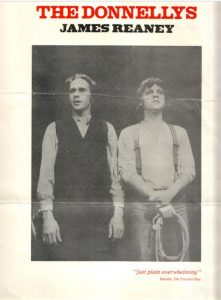In this excerpt from an August 2001 interview conducted by Tim Struthers and published in the Spring 2013 issue of the journal Short Story, James Reaney sheds light on his fascination with the Donnelly massacre of 1880.
James Reaney first heard about the Donnellys from his stepfather when he was a child in the mid-1930s.
JR: I remember saying to my stepfather at the time, “Wouldn’t they have a door with a lock on it?” And he said, “Noooo, they wouldn’t have had a door with a lock on it. They had a piece of burlap bag across a hole in their shanty” … so that was pretty dreadful.
Anyway I was scared out of my wits. It was only twenty miles away from our farm. We were pretty much right next to it all at one time. And I just couldn’t believe it.
In 1946, local historian Alice MacFarlane gave a paper on the Donnellys at a meeting of the London and Middlesex Historical Society at the public library in London.
JR: [Alice MacFarlane’s paper] had all the usual elements of the story that Kelley tells, that people tell about the Donnellys still. And when she got to the part in her paper about how the Donnellys cut out the tongues of horses … an old man rose up out of the audience and came at her with a shillelagh … And he said “They never cut the tongues out of horses. Out of people, yes!” … And then he stomped out…
But I was fascinated as I read this in The Globe and Mail … And I realized the Donnellys had friends. I never thought that before, you see.
TS: When was this?
JR: It would be 1946.
TS: While you were an undergraduate at the University of Toronto.
JR: Yes. I’d been thinking about writing a play about them. The Kelley thing [Thomas P. Kelley’s The Black Donnellys] had not been written by that time. He’s 1954. And you couldn’t write a play about the story my stepfather told. So finding out that they had friends made a big difference. I began to think in terms of a play about them that would be a tragedy, rather than the kind of thing where it’s not tragic at all and they should be exterminated as soon as possible (laughter). Like many a modern horror film.
Note from Susan Reaney: This interview is excerpted from the Spring 2013 issue of Short Story, New Series Vol. 21 No. 1, pages 115-116. See also “Winter’s Tales”, a poem James Reaney wrote in 1949, which makes an oblique reference to “…the massacre at Lucan / Where the neighbours killed all of the McKilligans dead.”
James Reaney wrote a trilogy of plays about the Donnelly family and the tragedy: Sticks and Stones (1973), The St. Nicholas Hotel (1974), and Handcuffs (1975). He also edited and wrote the introduction to The Donnelly Documents: An Ontario Vendetta, published by The Champlain Society in 2004. For more about James Reaney’s research on the Donnellys, see James Reaney on writing and researching the Donnelly plays.
The story of the Donnellys continues to fascinate us and has inspired many other playwrights, including Peter Colley and Paul Thompson. London historian and filmmaker Chris Doty restaged the Donnelly trial, and Jeff Culbert has created a one-man musical version The Donnelly Sideshow. Jonathan Christenson‘s rock opera version of the Donnelly tragedy, Vigilante, premiered in 2015 at Edmonton’s Citadel Theatre.

